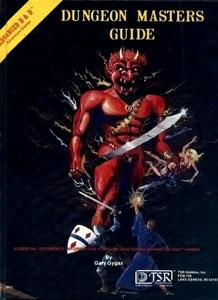D&D's Appendix N
Apr. 26th, 2017 12:23 amI recently happened across a discussion of the old "Appendix N" from Advanced Dungeons and Dragons, published in 1979. The appendix is a list of recommended reading from Gary Gygax, particularly books that inspired the game. I realized that while some of the inclusions on the list are authors I cut my fantasy teeth on (Norton, Tolkien), others I've never read, and still others I wonder about holding up to my current taste for fantasy.

I tried to create a checklist from one of the various list internet sites already populated with books, and many of these titles weren't included--which may say something about their lifespan. Barring a handy checklist, here's the listing.
I think one of the series that most heavily impacted my D&D style of play was definitely Tamora Pierce's "Lioness Quartet." Possibly also Patricia C. Wrede's Dealing with Dragons and Robin McKinley's The Blue Sword. I'd include those on any list of recommended fantasy for role playing gamers.

I tried to create a checklist from one of the various list internet sites already populated with books, and many of these titles weren't included--which may say something about their lifespan. Barring a handy checklist, here's the listing.
- Anderson, Poul: THREE HEARTS AND THREE LIONS; THE HIGH CRUSADE; THE BROKEN SWORD
- Bellairs, John: THE FACE IN THE FROST
- Brackett, Leigh
- Brown, Frederic
- Burroughs, Edgar Rice: "Pellucidar" series; Mars series; Venus series
- Carter, Lin: "World's End" series
- de Camp, L. Sprague: LEST DARKNESS FALL; THE FALLIBLE FIEND; et al
- de Camp & Pratt: "Harold Shea" series; THE CARNELIAN CUBE
- Derleth, August
- Dunsany, Lord
- Farmer, P. J.: "The World of the Tiers" series; et al
- Fox, Gardner: "Kothar" series; "Kyrik" series; et al
- Howard, R. E.: "Conan" series
- Lanier, Sterling: HIERO'S JOURNEY
- Leiber, Fritz: "Fafhrd & Gray Mouser" series; et al
- Lovecraft, H. P.
- Merritt, A.: CREEP, SHADOW, CREEP; MOON POOL; DWELLERS IN THE MIRAGE; et al
- Moorcock, Michael: STORMBRINGER; STEALER OF SOULS; "Hawkmoon" series (esp. the first three books)
- Norton, Andre
- Offutt, Andrew J.: editor of SWORDS AGAINST DARKNESS III
- Pratt, Fletcher: BLUE STAR; et al
- Saberhagen, Fred: CHANGELING EARTH; et al
- St. Clair, Margaret: THE SHADOW PEOPLE; SIGN OF THE LABRYS
- Tolkien, J. R. R.: THE HOBBIT; "Ring trilogy"
- Vance, Jack: THE EYES OF THE OVERWORLD; THE DYING EARTH; et al
- Weinbaum, Stanley
- Wellman, Manley Wade
- Williamson, Jack
- Zelazny, Roger: JACK OF SHADOWS; "Amber" series; et al
I think one of the series that most heavily impacted my D&D style of play was definitely Tamora Pierce's "Lioness Quartet." Possibly also Patricia C. Wrede's Dealing with Dragons and Robin McKinley's The Blue Sword. I'd include those on any list of recommended fantasy for role playing gamers.



